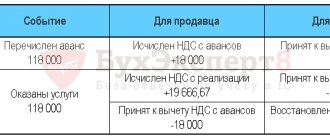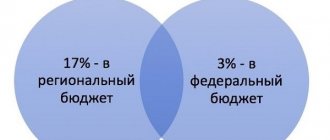From the beginning of 2021, an increased VAT rate came into effect. Now it is 20%. In this regard, entrepreneurs had to prepare for changes. A company may have an agreement that was concluded before the new year, but continued to be valid after the onset of 2021. It is assumed that prices are indicated taking into account the previous VAT of 18%. Is it necessary to draw up an additional agreement in this case? It all depends on the specific case.
- Form and sample
- Free download
- Online viewing
- Expert tested
FILES
The legislative framework
Let us turn to the Federal Tax Service Letter No. SD-4-3/ [email protected] dated 10.23.2018. It provides clarification on how to deal with this tax during the transition period. From January 1, everyone without exception switched to 20%. And it doesn’t matter when the contract was concluded.
But usually the document strictly states “18 percent.” This means that this condition needs to be officially adjusted. Accordingly, if tax conditions are not specified in the text, then there is no need to sign anything additional.
Some prescribed in advance the possibility of revising the cost unilaterally when amending the legislation. They also don’t need extra documents.
If the other party is against increasing VAT
Situations with any changes can take different turns and reach controversial points. Often one party neglects the provision of services, payment of VAT and, in general, the performance of duties. The case can lead not only to the termination of mutually beneficial relationships and contracts, but also to litigation.
It is possible that the buyer will refuse the increased cost of the product. Given this fact, the difference in price will be borne by the supplier, and his company will reflect this in the form of a reduction in the selling price.
Often in such cases, the selling company sues and wants to force the other party to sign an additional agreement by order. But here you should not rely entirely on the judicial institution, since this practice is only gaining momentum, and it is not considered possible to predict the judge’s decision.
It is also worth paying attention to the Letter of the inspection body dated October 23, 2021, which states that the additional agreement is not mandatory.
How to specify a change in the VAT rate in a contract
It all depends on what formulations were used initially. The following options are possible (for example, let’s take the cost of 100,000 rubles).
| Formulation | What to do | New edition |
| 100,000 rub. + VAT | There is no need to change anything, since the exact amount of the tax is not given | – |
| 100,000 rub. excluding VAT | There is no need to change anything, since there is no indication of the amount of tax | – |
| 100,000 rubles + 18% | Change to current value | 100,000 rubles + 20% |
| 118,000 rubles, including value added tax 18,000 rubles | Recalculate taking into account the current value | 120,000 rubles, including value added tax 20,000 rubles |
A letter sent to a counterparty about a change in the VAT rate is an example of the fact that you are trying to prevent all possible omissions in advance.
VAT rates from 2021
Starting from January 1, 2021, the following VAT tax rates apply:
| Bid | Terms of Use |
| 0% (no change) | Sales of goods for export that undergo customs clearance; Transportation between countries; Transportation operations for oil and its by-products. |
| 10% (no change) | Sale of food products; Sale of goods intended for children; Sale of medicines and medical supplies; Sale of printed publications and periodicals related to education and culture. |
| 20% (until 01/01/2019 - 18%) | All other transactions that do not fall into the 0% and 10% categories. |
Attention! In addition, in the case where the price already includes VAT, it will be necessary to use the new calculated rate of 20/120 to highlight it.
Additional agreement to change the VAT rate: sample
The additional agreement on changing the value added tax rate should resolve all discrepancies that arose in connection with amendments to the legislation. In general, its structure looks like this:
- A title indicating the number and date of conclusion of the original document.
- Date and city of signing.
- Point to be reformulated.
- Its new edition.
- Effective date of the new provisions.
- Details and signatures.
We discussed above how to correctly specify the VAT rate in the contract. However, in the additional agreement it is advisable to do this as precisely as possible.
But there is another opinion. In accordance with it, during the transition period it is better to refrain from indicating the amount of tax liability. This applies to both percentage and monetary terms. It is better to simply refer to paragraph 3 of Article 164 of the Tax Code.
More about VAT
- recommendations and assistance in resolving issues
- regulations
- forms and examples of filling them out
ConsultantPlus TRY FREE
Rules for signing amendments to the contract
Due to the increase in VAT by 20%, the rules for signing the relevant documents are relevant.
The agreement to the contract does not have a special form at the legislative level; the main thing is the principle of business etiquette. In the middle of the application the name itself is written, and just below it is the name of the document to which the agreement is concluded, in this case, it is an agreement, the date of signing and its number.
The new line on the left indicates the place where the act is drawn up, and on the right the date of this process.
It is necessary to identify each of the parties and sign the last name, first name and patronymic of the persons who represent these organizations. It is indicated that the parties have entered into this contract and its details are specified.
Below is the content section. It is being built according to plan:
- 1 – information on the cost of the goods and separately including VAT 18%, for example, 11,800 rubles and 1,800 rubles, respectively, for a specific period (until the end of 2021).
- 2 – data on the price increase and separately taking into account tax as of January 1, 2021, that is, 12,000 rubles and 2,000 rubles.
- 3 – it displays a phrase indicating the preservation of the remaining conditions.
- 4 – the place where it is written that this agreement is an integral part of the purchase and sale agreement and comes into effect from the moment it is signed.
- 5 – the presence of two copies is prescribed, and both parties have equal legal force.
- Signatures, details and seal, if used.
Personal Tax Management
From January 1, 2021, the VAT rate will increase from 18% to 20% in relation to goods (work, services), property rights shipped (performed, rendered), starting from January 1, 2021. With the fact that in contracts and agreements concluded from January 1, 2019, it will be necessary to indicate the VAT rate of 20%, everything is clear.
Questions remain regarding changes and the need to make such changes to contracts concluded before January 1, 2021. Making changes to existing agreements will allow companies to eliminate future disputes with counterparties and avoid claims from tax authorities regarding the calculation of VAT.
Taxpayer questions boil down to the following:
Is it possible to apply a VAT rate of 18% to payments and supplies/provision of services/performance of work if the contract was concluded by the parties before January 1, 2021?
Is it necessary to conclude additional agreements to existing contracts?
Is it possible now to include in contracts a condition that a VAT rate of 20% is applied to goods (work, services) shipped (performed, rendered) from January 1, 2019?
What should be indicated in the additional agreement to the contract if its conclusion is related to a change in the VAT rate?
How to calculate VAT if no changes are made to the contract?
Is it possible to require (including in court) the counterparty to pay an increased amount?
Let's consider each of the questions separately:
1. Is it possible to apply a VAT rate of 18% to payments and supplies/provision of services/performance of work if the contract was concluded by the parties before January 1, 2021?
The law does not make the amount of the applicable VAT rate dependent on the date of signing the agreement.
Federal Law No. 303-FZ of August 3, 2018 “On Amendments to Certain Legislative Acts of the Russian Federation on Taxes and Fees” does not provide for exceptions in relation to goods (work, services), property rights sold under contracts concluded before January 1, 2021 , including providing for the transfer of advance payments. This position was also taken by the Russian Ministry of Finance in its Letter dated 08/06/2018 N 03-07-05/55290.
Therefore, if the seller ships the goods and the contractor provides services in 2021, he must charge a tax at a rate of 20%. The new VAT rate is applied to goods/services/works shipped/performed starting from January 1, 2021, as specified in clause 4 of Art. 5 of the Federal Law of August 3, 2018 No. 303-FZ.
2. Is it necessary to conclude additional agreements to existing contracts?
It all depends on the terms of your agreement with the counterparty. There is no need to conclude additional agreements to the following contracts:
- if the parties agree on a condition in the contract that gives the seller/performer/contractor the right to unilaterally increase the price if legislators increase the VAT rate;
- if the terms of the contract provide for agreement on the price of goods/services/work in separate specifications/additional agreements/applications and other additional documents to the contract;
- if the contract sets the price of the product/service/work without VAT and the wording “excluding VAT” is directly stated in the contract. In this case, the supplier/contractor must charge VAT on top of the price of the product/service/work. In 2021, the supplier/contractor calculates VAT in the amount of 18 rubles. (100 ₽ × 18%). And in 2021 the tax will be 20 rubles. (100 ₽ × 20%).
3. Is it possible now to include in contracts a condition that a VAT rate of 20% is applied to goods (work, services) shipped (performed, provided) from January 1, 2021?
Can. The legislation of the Russian Federation does not establish such obstacles. The norms of the Civil Code of the Russian Federation state that the execution of a contract is paid at the price established by agreement of the parties (clause 1 of Article 424).
We consider it necessary to differentiate between prices for 2021 and 2021 and subsequent years in newly concluded contracts. For example, you can use the following wording:
- “The monthly cost of services provided up to December 31, 2018 (inclusive) is 118 rubles. (including VAT 18%), and the monthly cost of services provided from January 1, 2021 is 120 rubles. (including VAT 20%)";
- “In 2021, the price of the product is 1180 (One thousand one hundred and eighty) rubles. per unit of goods, including VAT at a rate of 18 percent - 180 (One hundred and eighty) rubles. From January 1, 2021, the price of the product is 1200 (One thousand two hundred) rubles. per unit of goods, including VAT at a rate of 20 percent - 200 (Two hundred) rubles";
- “The monthly cost of services is 100 rubles. excluding VAT. VAT is applied additionally to the cost of services at the rates established by clause 3 of Article 164 of the Tax Code of the Russian Federation: until December 31, 2018 - at a rate of 18%, from January 1, 2019 - at a rate of 20%.”
As for the conditions for calculating the amounts of advance payments, we propose to use the following wording in contracts:
- “Advance payments paid in 2021 for the supply of goods/provision of services in 2021 are transferred by the Buyer/Customer based on the price of the goods for 2021, established taking into account VAT at a rate of 18 percent. The difference in price is 20 rubles. for each unit of goods/services arising in connection with an increase in the price of goods/services from January 1, 2021 due to an increase in the legally established VAT rate, the Buyer/Customer pays to the Seller/Contractor within___ calendar days after the Parties sign the invoice/act of delivery.
4.What should be included in the additional agreement to the contract if its conclusion is related to a change in the VAT rate?
If the agreement was concluded by the parties before January 1, 2021 and it indicates the price of the product/service/work with VAT at a rate of 18%, then when concluding an additional agreement it is necessary to fix the price of the product/service/work, the rate and the amount of VAT from January 1, 2021.
The terms of the additional agreement may be as follows:
- “From January 1, 2021, the price of the product is 1200 (One thousand two hundred) rubles. per unit of goods, including VAT at a rate of 20 percent - 200 (Two hundred) rubles.”
- “From January 1, 2021, the monthly cost of services is 100 rubles. excluding VAT. VAT is applied additionally to the cost of services at a rate of 20%.”
Of course, it would be optimal if such an additional agreement was signed with the counterparty in 2021. However, if the signing of the additional agreement takes place only after January 1, 2021, then in terms of determining the cost of services and the VAT rate, the additional agreement will need to be extended to the relations of the parties established from January 1, 2019 (in accordance with paragraph 2 Article 425 of the Civil Code of the Russian Federation).
5. How to calculate VAT if no changes are made to the contract?
Many people wonder what to do if the counterparty does not agree to make changes to the contract and sign an additional agreement? Or, if circumstances arise in which it is not possible to draw up and sign such an additional agreement?
For example, the contract says that the price of the goods is 118 rubles, including VAT. You proposed to the counterparty to increase the price of goods/services/work from January 1, 2021 due to the fact that, in accordance with the Federal Law, the VAT rate was increased. But the counterparty did not agree with this. Then the amount of tax should be determined based on the price indicated in the contract, at the calculated rate. So, the tax amount will be 19.67 rubles. (118 ₽ × × 20/120). Therefore, the price without tax will be equal to 98.33 rubles. (118 – 19.67).
As you can see, it is still safer to separate VAT from the price that the parties established in the contract.
6. Is it possible to require (including in court) the counterparty to pay an increased amount?
Can. There is a possibility that the counterparty will respond to the request and will pay the cost of goods/services/work, applying a 20% VAT rate to the price.
As for satisfying such a requirement in court, it is quite difficult to predict the outcome of judicial consideration of such disputes.
The Tax Code states that the supplier presents the buyer with the amount of VAT in addition to the price of the goods (clause 1 of Article 168 of the Tax Code). Indeed, if the price of goods excluding VAT is 100 rubles, then in 2021 the supplier/contractor must charge this tax in the amount of 20 rubles.
But there is no judicial practice on the price of goods in connection with an increase in the VAT rate. And in controversial situations with VAT, judges can shift the risks to the supplier/executor (ruling of the Supreme Court dated April 23, 2018 in case No. A32-4803/2015). Perhaps they will offer the supplier/contractor to allocate VAT from the contract price at the estimated rate (clause 17 of the resolution of the Plenum of the Supreme Arbitration Court dated May 30, 2014 No. 33).
In a similar situation, when since 2004 the VAT rate changed from 20% to 18%, the courts also indicated that changing the cost of goods (work, services) taking into account the new tax rate is possible only by agreement of the parties. For example: the lessee demanded a price reduction of 2%, since the tax rate had been reduced since 2004. But the Federal Antimonopoly Service of the Ural District, in Resolution No. F09-4928/08-S5 dated July 8, 2008, indicated that even if the cost of services is indicated taking into account 20% VAT - “120, incl. VAT 20%”, then the lease payment can be recalculated only by agreement of the parties.
In accordance with paragraph 1 of Art. 422 of the Civil Code of the Russian Federation, the contract must comply with the rules mandatory for the parties, established by law and other legal acts in force at the time of its conclusion. The execution of the contract is paid at the price established by agreement of the parties (clauses 1, 2 of Article 424 of the Civil Code of the Russian Federation).
If, after the conclusion of an agreement, a law is adopted that establishes rules binding on the parties, other than those that were in force at the conclusion of the agreement, the terms of the concluded agreement remain in force, except in cases where the law establishes that its effect extends to relations arising from previously concluded agreements (Clause 2 of Article 422 of the Civil Code of the Russian Federation).
Federal Law No. 303-FZ dated August 3, 2018 (on increasing the VAT rate from 18% to 20%) does not directly establish that its effect applies to contracts concluded before January 1, 2021. Consequently, for the purpose of calculating VAT, the seller/ the contractor is obliged to calculate the amount of VAT at a rate of 20%, but in accordance with the norms of the Civil Code of the Russian Federation, the seller/contractor has no grounds for automatically increasing the cost of goods/services/work established by an agreement concluded before January 1, 2021, by 2% VAT, i.e. e. the total cost specified in the contract, including VAT, must remain unchanged.
A change in the VAT rate can also be qualified as a significant change in circumstances (Article 451 of the Civil Code of the Russian Federation).
A significant change in the circumstances from which the parties proceeded when concluding the contract is the basis for its modification or termination, unless otherwise provided for by the contract or follows from its essence. But a change in circumstances is considered significant when they have changed so much that, if the parties could have reasonably foreseen it, the contract would not have been concluded by them at all or would have been concluded on significantly different terms.
However, a contract can be terminated or amended under certain circumstances only if an increase in the VAT rate, which the parties did not anticipate when concluding the contract, will lead to significant damage to the seller/performer if he performs the contract on the same terms.
Moreover, if the parties have not reached an agreement to bring the contract into compliance with significantly changed circumstances or to terminate it, the contract may be terminated, and on the grounds provided for in paragraph 4 of Article 451 of the Civil Code of the Russian Federation, amended by the court at the request of the interested party if there are simultaneously the following conditions (clause 2 of article 451 of the Civil Code of the Russian Federation):
- at the time of concluding the contract, the parties assumed that such a change in circumstances would not occur (i.e., we can only talk about contracts concluded before the publication of Law No. 303-FZ - until 08/03/2018);
- the change in circumstances was caused by reasons that the interested party could not overcome after their occurrence with the degree of care and prudence that was required of it by the nature of the contract and the conditions of turnover;
- execution of the contract without changing its terms would so violate the relationship of property interests of the parties corresponding to the contract and would entail such damage for the interested party that it would largely lose what it had the right to count on when concluding the contract;
- It does not follow from customs or the essence of the contract that the risk of changes in circumstances is borne by the interested party.
Amendment of the contract due to a significant change in circumstances is permitted by a court decision in exceptional cases when termination of the contract is contrary to public interests or will entail damage for the parties that significantly exceeds the costs necessary to execute the contract on the terms changed by the court (Clause 4 of Article 451 of the Civil Code of the Russian Federation) .
As you can see, it is possible to require the counterparty to pay an increased amount due to an increase in the VAT rate, but such a process will be very costly not only financially, but also in time, and this is without a guarantee of completion of the process in your favor.
In what cases may a VAT letter be required?
Often, when concluding a business contract with a new partner, the organization is required to provide evidence of the fact of working with VAT or exemption from this tax.
What is this for?
Thus, the organization requesting the letter seeks
minimize your own tax risks and eliminate cooperation with unscrupulous counterparties.
Confirmation of the fact of working with VAT from a potential partner is required so that in the future the company does not have difficulties with refunding taxes from the budget.
Whereas companies in special regimes are usually asked for an information letter confirming the existence of legal grounds not to include VAT in the price of goods and services.
Sometimes such information was requested by extra-budgetary funds to confirm the availability of benefits on insurance premiums (simplified people usually have the right to reduced rates).
But today, if necessary, they receive this data through interdepartmental information exchange channels.






